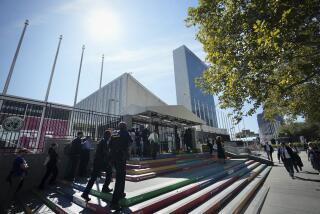Super Power Lunch
- Share via
Whether Wednesday’s meeting in New York City is a summit or simply a super power lunch, there is much to talk about. Keeping up momentum on arms control, getting Soviet troops in Europe to shift from offensive to defensive formations, and identifying specific steps to reduce tensions the world over are only the beginning. So nobody should be timid about ordering seconds on dessert if that is what it takes to linger a while.
Some Americans, remembering how close Soviet General Secretary Mikhail S. Gorbachev came to talking President Reagan into nuclear disarmament at Reykjavik in 1986, talk about the New York meeting as though it were a trap.
But the relationship between the United States and the Soviet Union has indeed changed since then--not radically, but certainly enough for serious talks about what should happen next. Wednesday’s meeting is likely to be less a trap than an opportunity, and President-elect George Bush should take advantage of it.
There is some grumbling that Gorbachev will turn the New York visit into a propaganda coup, and that is probably valid. He can talk about anything he chooses at the United Nations, and shaking hands on Fifth Avenue or visiting Wall Street will be irresistible to the world press, so there is nothing that anyone can do about that.
Even if they can’t cramp Gorbachev’s style, Reagan and Bush can make progress on substance. Reagan plans to tell Gorbachev, for example, that Bush’s presidency will represent both change and continuity--a good place for the luncheon conversation to begin. They cannot possibly cover everything in detail, but the least that should come from the meeting is a full list of problems that need discussion, with a general schedule for addressing them in order of importance. Europe tops any such list, partly because armed forces of both East and West are face-to-face there and partly because major change is both inevitable and imminent. West Germany and America’s other West European allies will start moving toward a single economy in 1992. Both the Soviet Union and its East European allies will want close ties with the new Europe. It is crucial that Moscow and Washington agree on the terms under which those can occur so that change represents a minimal threat to either superpower.
Talking about Europe means talking about deep cuts in troop strength of both the North Atlantic Treaty Organization and the Warsaw Pact. As long as Soviet Bloc tanks, infantrymen and tactical aircraft outnumber West European forces by as much as four to one in some categories, peace for Europe will remain just a slogan.
Cuts in European troop strength will in turn depend on reductions in long-range nuclear missiles because NATO policy still envisions nuclear retaliation against any invasion of Western Europe. And, of course, solutions to any of these and other superpower disagreements in Europe inevitably will involve Europe itself and the fact that not all European nations see the future in the same way.
It would take a full-fledged summit meeting, and then some, just to write out instructions for negotiators to follow during months and perhaps years of detailed steps toward a resolution of the issues in Europe and long-range arms control alone. Neither superpower can hope for more from the meeting than a list of the most important problems and a schedule for starting serious talks about them. Nor should either settle for less.
More to Read
Sign up for Essential California
The most important California stories and recommendations in your inbox every morning.
You may occasionally receive promotional content from the Los Angeles Times.













